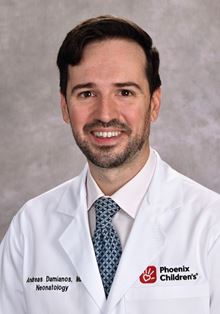Caring for neonates, whether they are born very prematurely or full term with severe conditions, is a demanding task that requires a multidisciplinary approach to provide personalized care for each baby. My role extends beyond the infants; it includes supporting their families, as the outcomes in the NICU significantly impact the entire family.
About Andreas D. Damianos, MD
Andreas Damianos, MD, is a neonatologist, a physician scientist at Phoenix Children's and an assistant professor of Pediatrics with the University of Arizona. As a neonatologist, Dr. Damianos is dedicated to the diagnosis, management and prevention of neonatal conditions in babies requiring intensive care services. As a physician scientist he is actively engaged in translational research at the Phoenix Children's Research Institute.
After earning his medical degree from the University of Athens School of Medicine in Athens, Greece, Dr. Damianos received his pediatric training in New Jersey and completed his neonatology fellowship at the Holtz Children's Hospital, Jackson Memorial Hospital, University of Miami in Miami, where he served as chief fellow. He joined Phoenix Children's from Cincinnati Children's where he served as an attending neonatologist and assistant professor of Pediatrics with the University of Cincinnati.
Dr. Damianos is board certified by the American Board of Pediatrics. He is a member of the American Academy of Pediatrics, the Society of Pediatric Research and the Medical Association of Athens, Greece.
Dr. Damianos believes that the future of neonatology lies with strong, collaborative, hypothesis-driven research. From bedside observations witnessing that many extreme preterm neonates are predisposed to worse outcomes that affect not only their lungs but all the body, Dr. Damianos embarked to study the etiologies of such conditions, and focus on their prevention and treatment. Dr. Damianos joined the Phoenix Children's Research Institute where he is involved in translational research projects along with his mentor and director, Dr. Kalinichenko. He has shared his research in peer-reviewed publications including the American Journal of Respiratory Cell and Molecular Biology, Seminars in Perinatology, the Journal of Applied Physiology, Stem Cells Translational Medicine and Seminars in Fetal and Neonatal Medicine. He also has been an invited speaker for the Pediatric Academic Societies and the American Academy of Pediatrics.
In his free time, Dr. Damianos enjoys traveling, sketching, painting, do-it-yourself projects and board games.
Medical School / Education
National and Kapodistrian University of Athens School of Medicine, Athens, Greece
Residency
(Pediatrics) Unterberg Children's Hospital at Monmouth Medical Center / Drexel University College of Medicine, Long Branch, NJ
Fellowship
(Neonatal-Perinatal Medicine) Holtz Children's Hospital / Jackson Memorial Hospital / University of Miami School of Medicine, Miami, FL
Pediatrics
American Board of Pediatrics
Academic Affiliations
Assistant Professor, Pediatrics, University of Arizona College of Medicine - Phoenix
Professional Affiliations
Member, Society of Pediatric Research
Member, American Academy of Pediatrics
Member, Medical Association of Athens, Greece
Damianos A, Xu K, Kalin GT, Kalinichenko VV. "Placental Tissue Stem Cells and Their Role in Neonatal Diseases" Semin Fetal Neonatal Med. 2022 Feb;27(1):101322. doi: 10.1016/j.siny.2021.101322. Epub 2021 Dec 20. PMID: 34953760
Sharma M, Bellio MA, Benny M, Kulandavelu S, Chen P, Janjindamai C, Han C, Chang L, Sterling S, Williams K, Damianos A, et al. "Mesenchymal Stem Cell-derived Extracellular Vesicles Prevent Experimental Bronchopulmonary Dysplasia Complicated By Pulmonary Hypertension" Stem Cells Transl Med. 2022 Aug 23;11(8):828-840. doi: 10.1093/stcltm/szac041. PMID: 35758326; PMCID: PMC9397655
Damianos A, Kulandavelu S, Chen P, Nwajei P, Batlahally S, Sharma M, Alvarez-Cubela S, Dominguez-Bendala J, Zambrano R, Huang J, Hare JM, Schmidt A, Wu S, Benny M, Claure N, Young K. "Neonatal Intermittent Hypoxia Persistently Impairs Lung Vascular Development and Induces Long-term Lung Mitochondrial DNA Damage" J Appl Physiol (1985). 2022 Nov 1;133(5):1031-1041. doi: 10.1152/japplphysiol.00708.2021. Epub 2022 Sep 22. PMID: 36135955
Damianos A, Kalinichenko VV. "Hedgehog and Platelet-derived Growth Factor Collaborate to Guide Fibroblasts During Alveolarization" Am J Respir Cell Mol Biol. 2023 May;68(5):472-474. doi: 10.1165/rcmb.2023-0031ED. PMID: 36796088
Damianos A, Sammour I. "Barriers in Translating Stem Cell Therapies for Neonatal Diseases" Seminars in Perinatology. 2023 Apr;47(3):151731. doi: 10.1016/j.semperi.2023.151731. Epub 2023 Mar 16. PMID: 36990922
Damianos A, Kalinichenko VV. "The Plant Hormone Indole-3-Acetic Acid Helps the Endothelial Barrier Seal After Lung Injury" Am J Respir Cell Mol Biol. 2024 Sep;71(3):264-266. doi: 10.1165/rcmb.2024-0209ED. PMID: 38857531


